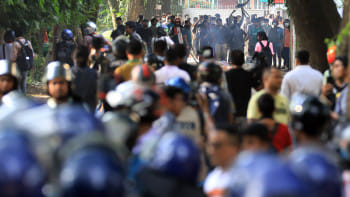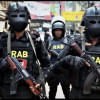Expectations from the advisers and a few words of caution

Exaggerated speech in public sphere can create discomfort, especially during times of fear and apprehension. At such times, even simple words spoken by persons in responsible positions may sound like exaggeration. It is too early to evaluate the performance of the interim government led by Dr Yunus. However, I feel the need to reflect on certain words spoken by the home affairs adviser Brigadier General (retired) Sakhawat Hussain.
He said, "I get phone calls at night about robbery taking place at such and such a location. I tell them to pray to Allah; there's nothing else to be done."
These words from the adviser indicate how people were spending their days and nights. Was the adviser able to perceive the mental state of the people who called him at night and listened to his advice to pray to the Almighty? Assuming that he did, the next question that arises is, when did he say this, and why? Wasn't there anything else to do at all? The advisers took oath on August 8, which was a Thursday. After the weekend, they started their official work on Sunday, August 11 when the adviser delivered the above-mentioned speech. We neither heard nor saw much of an effort to bring the law and order situation under control within the first four days of their oathtaking. One excuse could be the absence of the police force and the other the weekend; but how acceptable are these?
Reports about the persecution of minorities, especially the followers of Hindu religion, were pouring in from different parts of the country. Dhaka was gripped by fear of robbers. Though the police were absent, the army was present in the field. Their presence could have been more visible. The home affairs adviser had Rapid Action Battalion, Border Guard Bangladesh and Ansar under his command. He could have deployed them in places where the minorities were allegedly being harmed. But instead, a rumour was spread out that hundreds of Hindus gathered around the border to escape to India. It was necessary to inform people about the probable authenticity of this news. Weekends cannot be an excuse for not delivering proper information. The home affairs adviser could have visited the affected areas. It's not too difficult to visit even ten spots in a day. The Hasina regime used helicopters to fire upon the general people; the home affairs or other advisers could have used helicopters to visit people and stand beside them. That would have brought back some comfort among the worried masses. The "robber rumour" wouldn't have spread like fire if more army personnel were deployed in different areas of Dhaka. Ensuring that members of the Rapid Action Battalion were more active and Ansar members were patrolling neighbourhoods would have made a world of difference.
A day after the adviser said: "Media outlets, engaging in sycophancy, will be shut down" apologised for his comment. This means, his comment on media was not well thought out and planned. First of all, media doesn't fall under Sakhawat Hussain's jurisdiction. Secondly, advisers should instead talk about media freedom and play a vital role in creating free media and eliminating fear. Instead, it is unimaginable that an adviser from Dr Yunus's government apparently said something that could further create an environment of fear.
Regarding extortion and terrorism, Sakhawat said, "I have requested the army chief to break your legs." This cannot be the appropriate language of an adviser. "Don't cause suffering for the people. I would then ask the people to give you a beating"—such comments are not desirable as well. The adviser should be well aware of the risk of using such language when the law and order situation of the country is in such a vulnerable state.
Regarding politics, he said, "The politics of Bangladesh is the politics of sycophants. Politicians have not been made. Only sycophants were made." Now is not the time to talk about sycophantism in politics. There are others who can talk about it. People are expecting prompt actions from the advisers, which was absent in the last 15 years. The task of the advisers is to show what actions they are taking toward permanent policy reforms.
Just like the infamous quote by BNP government's Home Minister Altaf Hossain Chowdhury's—"Allah has taken back His creation" and the words of Dr Yunus' government's home affairs about "praying to Allah" are equally dangerous and unsettling. Threats of "beating" or "shutting down media" can be compared to similar statements by Hasina regime's Home Minister Mohiuddin Khan Alamgir.
"I am not the public, nor I am a politician. My background is that I am a soldier. My action will follow my words"—this statement from Sakhawat Hussain sounds like words spoken by an army-run government representative. The army rule wasn't a pleasant experience for the countrymen at all. However, the adviser's action of giving the police an ultimatum to return to work after discussing the issues with them is a praiseworthy act. We expect more such efforts from him.
People expect immediate actions, reactions and compassionate behaviour from the Noble Peace Prize winner Dr Yunus and his interim government's advisers. The advisers must remember that the whole nation has huge expectations from them after being deprived of their fundamental rights for more than 15 years. In fact, the whole world is looking at them. There's no scope for mistakes. Thus, the advisers should refrain from speech tactless and careless comments. The interim government must also ponder whether all advisers need to speak in front of the media. One adviser can be chosen as a representative to face the media.
We expect the advisers of the interim government to make statements that will remove confusion and controversy from society, not create them.
Translated from Bangla by Mohammed Ishtiaque Khan.
Golam Mortoza is the editor of The Daily Star Bangla.
Follow The Daily Star Opinion on Facebook for the latest opinions, commentaries and analyses by experts and professionals. To contribute your article or letter to The Daily Star Opinion, see our guidelines for submission.

 For all latest news, follow The Daily Star's Google News channel.
For all latest news, follow The Daily Star's Google News channel. 







Comments